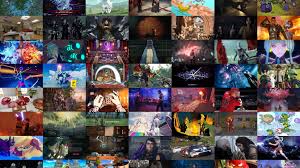Introduction: The video game industry has evolved significantly since its inception. From simple pixelated graphics to immersive virtual worlds, video games have transformed into a major part of global culture. This article traces the journey of video games, exploring key milestones in technology, gameplay, and cultural impact.
1. The Birth of Video Games: Classic Arcade Games
The early days of video gaming were dominated by arcade games like Pong and Space Invaders. These simple yet addictive games set the stage for the gaming industry to grow into a multi-billion dollar business.
- Why It Matters: Classic arcade games were the foundation of the video game industry, introducing millions to interactive entertainment.
2. The Rise of Home Consoles
In the 1980s, gaming moved from arcades to home consoles, with the launch of systems like the Atari 2600 and the Nintendo Entertainment System (NES). These consoles brought gaming into the living rooms of households worldwide, making gaming a social and family activity.
- Why It Matters: Home consoles democratized gaming, allowing people to experience high-quality video games at home.
3. The Golden Age of 3D Gaming
The late 1990s and early 2000s saw the rise of 3D graphics, with iconic titles like Super Mario 64, The Legend of Zelda: Ocarina of Time, and Final Fantasy VII. These games pushed the boundaries of what was possible in terms of game design, storytelling, and visual fidelity.
- Why It Matters: The advent of 3D graphics took gaming to the next level, making games more immersive and visually stunning.
4. The Rise of Online Gaming
Online multiplayer games, like World of Warcraft and Fortnite, revolutionized how people interact within virtual worlds. Players could now compete or cooperate with others from around the globe, leading to the rise of esports and online communities.
- Why It Matters: Online gaming created a sense of global community and competition, transforming gaming into a social experience.
5. Virtual Reality: The Future of Gaming
Virtual reality (VR) is the next frontier in gaming. VR headsets like the Oculus Rift and PlayStation VR are creating fully immersive experiences where players can interact with virtual environments in real-time, blurring the lines between the real and digital worlds.
- Why It Matters: VR represents a new dimension of immersion, allowing players to experience video games like never before.
Conclusion: From humble beginnings in arcades to the cutting-edge technology of VR, video games have come a long way. The industry continues to innovate, pushing boundaries and offering new ways to engage with virtual worlds.
